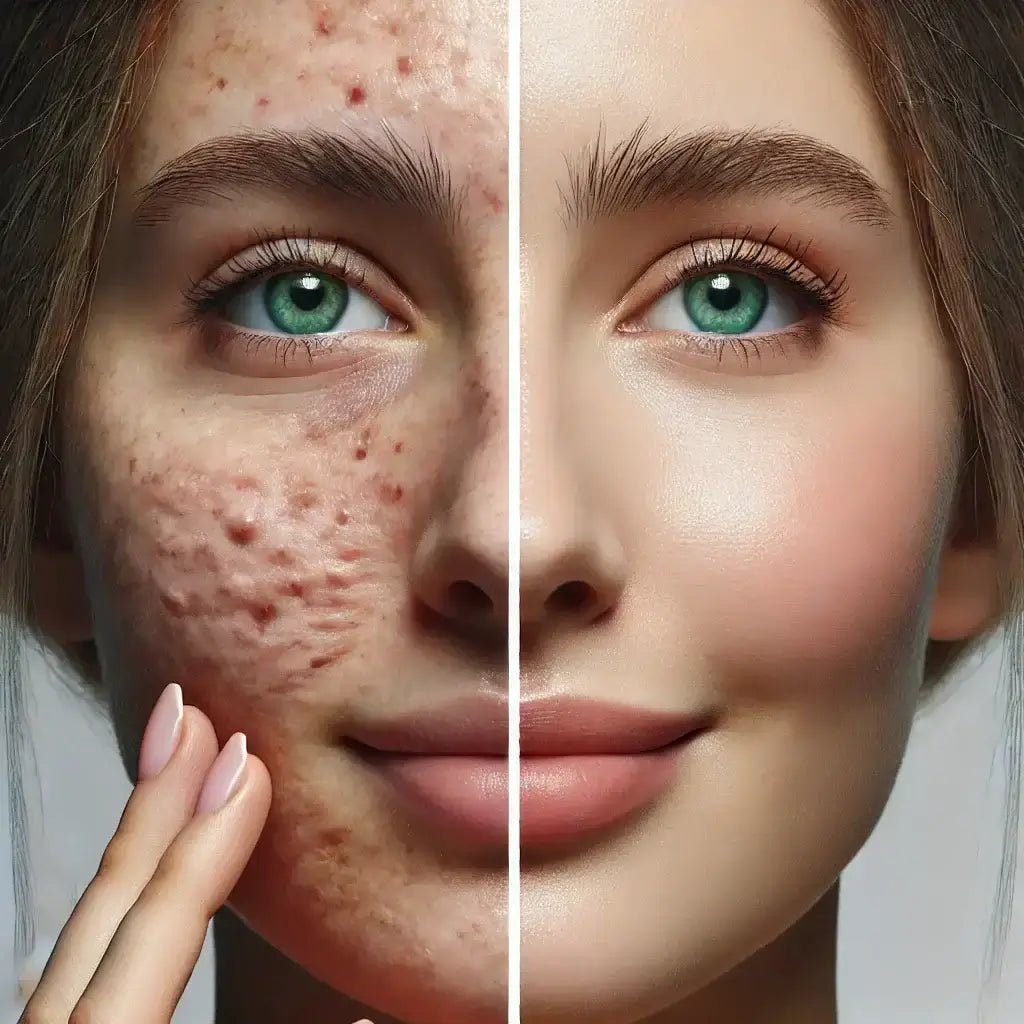Can Peptides Cause Acne? Understanding Their Effects on Skin Health

What's the Deal with Peptides and Acne: The Peptides That Might Bring On Your Acne and The Ones That Help
What are peptides and do they cause Acne?
Peptides are tiny chains of amino acids that make up collagen proteins and other important proteins in the body. Cosmetic peptides in skincare could make your skin feel better and assist in anti-aging. But synthetic peptides that help performance, such as growth hormone secretagogues, can cause an outbreak of acne by messing with hormones.
Understanding what differentiates one peptide from another is critical when it comes to caring for your skin health. This extensive guide will cover both the acne-inducing peptides (those used and abused by bodybuilders and people hoping to stay looking young) and the good-for-your-skin peptides (which can be found in peptide based skincare products).
The Hormonal Link to Acne
Sebum production build-up, white-heads, clogged pores, skin-bacteria which multiples cause inflammations which is acne development. IGF1 is a potent mitogen for virtually all body tissues, it promotes acne via hyperkeratinization. This can disrupt the skin barrier, and the skin can feel bad (irritated skin).
How Peptides In Growth Hormone Induce Acne
Performance peptides are also what cause acne flare ups:
- And peptides like the CJC-1295 and the GHRP-6 cause the body to make growth hormone
- In the presence of an excess of growth hormone, IGF-1 production can be increased
- IGF-1 might be involved in the pathogenesis of acne by increasing both expression of inflammatory biomarkers and also sebum production in sebocytes
- It furnishes microorganisms, including Propionibacterium acnes (or P. acnes) which tends to cause acne (acne causing bacteria), with excess oil
Why Some People Get Breakouts and Others Don't
Individual responses vary based on:
- It is in your genes to have acne prone skin
- Baseline hormone levels
- Skin types (oily vs. dry)
- Age and gender
- Peptide dosage and cycle length
- Pre-existing sensitive skin conditions
Peptide Types: The Good and The Bad
Growth Hormone-Releasing Peptides (Acne Risk: HIGH)
CJC-1295: After a single injection of CJC-1295, there were dose-dependent increases in mean plasma GH concentrations by 2- to 10-fold for 6 d or more and in mean plasma IGF-I concentrations by 1.5- to 3-fold for 9-11 d. Excessive androgen results in the all too common problem of acne due to skin health disruption.
GHRP-6: Works synergistically with CJC-1295. GHRP-6 acts as a baseline GH booster, increasing the set level of GH. If you're a woman, there may be makeup and other buildup from the environment that can make things worse, adding to the risk of acne and the state of overall skin health in general.
Ipamorelin: Lighter than some other GHRPs, but may still result in breakouts for the sensitive skinned.
Healing Peptides (Acne Risk: LOW)
BPC-157: Unlike growth hormone peptides, BPC is an anti-inflammatory peptide, when placed on the skin it works on hyperpigmentation, acne scars, and most importantly increases collagen production. It is also beneficial for skin regeneration and wound healing.
Cosmetic Peptides (Acne Risk: MINIMAL)
Copper Peptides: Anti inflammatory properties, and can help in moderating inflammation while dealing with acne scars
Antimicrobial Peptides: Have antimicrobial properties to assist in controlling bacteria as well as soothing skin impurities (calm irritated skin)
Collagen Peptides: Support skin's structure and improve skin texture without influencing hormones
Pros and Cons: A Fair Look
Benefits of Performance Peptides
- Enhanced recovery and skin repair
- Anti inflammatory effects
- Improved body composition
- Better sleep quality
- Increased energy and cell growth
Benefits for Skin Health
When used properly, certain peptides may:
- Enhance skin hydration and inhibit moisture retention loss
- Boost skin firmness and skin elasticity
- Stimulates production of collagen support collagen synthesis and stimulating collagen production
- Create a more youthful appearance
- Reinforce skin barrier and keep moisture for long hours (better moisture retention)
The Acne Trade-Off
Growth hormones can potentially affect the sebaceous glands in the skin that secrete the grease-like substance known as sebum, which will promote acne if overproduced.
Common acne-related side effects include:
- Increased oiliness within 1-2 weeks
- Breakouts peaking at 4-8 weeks
- Cystic acne in severe cases
- Compromised skin barrier function
- Potential scarring if untreated
The IGF-1 and Hormone Connection
How IGF-1 Causes Acne
IGF-1 stimulates 5α-reductase, adrenal and gonadal androgen synthesis, androgen receptor signal transduction, sebocyte proliferation and lipogenesis. This creates an environment that exacerbates certain specific skin concerns.
Testosterone and DHT Amplification
So while peptides may not increase testosterone themselves, they boost androgenic activity:
- IGF-1 increases 5α-reductase activity
- This is the process which turns testosterone into DHT (5x more potent)
- 5α-reductase enzyme in the infundibular sebocytes can convert the testosterone to the 5–10 times more active DHT
- This speeds up cell turnover and oil production
Preventing Peptide-Induced Breakouts
Before Starting Peptides
-
Evaluate Your Risk
- Acne or allergic reactions history
- Current skin tone and condition
- Look for peptide component known allergy
-
Prepare Your Skin
- Create a daily skincare routine
- Use non-comedogenic skincare products
- Consider pre-treatment with active ingredients
During Peptide Cycles
-
Start Low, Go Slow
- Use minimum dose required to achieve the desired effect
- Monitor overall skin texture weekly
- Adjust based on skin concerns
-
How to use
- Double cleanse to keep your pores clear (clogged pores)
- Try salicylic acid or benzoyl peroxide
- Use hyaluronic acid to hydrate the skin (skin hydration)
- Add in the vitamin C for prevention from antioxidants
- Include glycolic acid for light exfoliation
-
Dietary Support
- Reduce high-glycemic foods
- Limit dairy intake
- Increase omega-3 fatty acids
- Hydrate for healthier skin health
Treatment Options for Active Breakouts
Topical Treatments
- Retinoids: Normalise Cell Turnover And Enhances The Texture Of The Skin (improve skin texture)
- Benzoyl Peroxide: Kills bacteria effectively
- Salicylic Acid: An exfoliant which helps to break down the clogging mechanisms in the skin and also has an anti inflammatory action
- Niacinamide: Provides anti inflammatory benefits
Supporting Ingredients
- Hyaluronic Acid: Keeps skin hydration and does not clog pores
- Vitamin C: Evens skin tone and helps support collagen production
- Glycolic Acid: Exfoliates to enhances texture
Oral Options
- Zinc supplementation for managing acne
- Healthy fats like omega-3 fatty acids to fight inflammation (reduce inflammation)
- Probiotics for gut-skin axis support
Professional Interventions
- Prescription acne treatments if severe
- Professional extractions
- LED light therapy
- Chemical peels for acne scars
Post-Cycle Acne Management
Acne might continue after peptides when hormones go out of balance. Post-cycle care includes:
- Supporting skin regeneration naturally
- Daily skincare routine for 2-3 months
- Focus on skin repair, the prevention of scars
- Paying attention to healing skincare ingredients
How to Incorporate Peptides Safely
For Those New to Peptides
When you should incorporate peptides:
- You can begin with peptide based skincare products topical
- Patch Test For skin irritation or allergic reactions
- Monitor your skin's response carefully
- Adapt usage to the skin types
Choosing the Right Peptides
Choose peptides according to your specific skin concerns:
- Copper peptides for aging and recovery
- Antimicrobial peptides for acne-prone skin
- Collagen peptides for firmness and elasticity
Special Considerations for Peptide Stacks
High-Risk Combinations
CJC-1295 + GHRP-6: CJC-1295 will then boost GH release in a pulsatile manner, using the new higher baseline set by GHRP-6, for the greatest skin benefits and risk of acne.
Lower-Risk Alternatives
- BPC-157 for wound healing and skin repair
- Cosmetic peptides for youthful appearance
- Thymosin Beta-4 for recovery
Skin Health and Collagen Growth
Performance peptides can trigger acne, but they can also give skin a smoother feel by promoting collagen growth:
- Collagen Synthesis: More skin-produced collagen is better
- The structure of the skin: More structure of the skin's structure
- Healing benefits: Heals acne spots fast
- Overall results over time: Skin elasticity is improved and skin feels softer
Managing Specific Skin Issues
For Irritated Skin
- Opt for collagen-boosting and anti inflammatory peptides
- Treat to sooth aggravated skin (calm irritated skin)
- Avoid aggressive active ingredients
For Aging Skin
- Maintain the focus on collagen (collagen production)
- Improve skin hydration (improve skin hydration)
- Moisturise, conventional, to keep an itch down (improve the hydration state of your skin: better moisture retention)
For Acne-Prone Skin
- Opt for non-comedogenic (non-pore clogging) formulas
- Peptides for the right acne treatment (treat acne)
- Helping skin barrier to work as it should
Here's How to Choose Responsibly
Before doing performance peptides:
- Assess Your Objectives: Consider grades based on how your skin benefits will benefit
- Understand your skin: What kind of skin do you have (skin types) and what causes it to become sensitive?
- Prepare: Lay some groundwork for hardcore pimple treatments (acne treatments)
- Explore other information: Alternative treatments for acne (managing acne)
- Experts: Need Advice? Ask question to people who knows a lot about peptides
Main Points
- You can expect skin breakouts (acne breakouts) with up regulating IGF-1 with growth hormone stimulating peptides
- IGF-1 mediates the action of pituitary GH during puberty, the induction of androgen production and stimulation of peripheral androgen metabolism
- All that said, there are hazards that can be minimized through the choice of the right objects (skincare products) and the performance of the right maneuvers
- Copper peptides and its cousin, antimicrobial peptides, on the other hand, are good for you, with no hormone-f*ing required
- To maintain healthy skin, you need a healthy barrier on your skin
- Peptides may help to a certain extent with skin healing by introducing amino acids back to the skin when used properly
The End
Peptides can be excellent and awful for your skin. Growth hormone-releasing peptides can cause acne through hormonal pathways, cosmetic peptides can help you feel better about your skin, stimulate production of collagen (collagen production) and help to keep your skin forever young (youthful appearance).
If you are familiar with these differences, you will be able to make informed decisions on how to use peptides. What does matter is choosing the right peptides for your individual skin concerns and the kind of skin you have, and maintaining a more general skincare routine that protects, supports and heals your skin, whether you're in that 'clear up the acne' or 'keep things looking smooth' phase.
The most benefit and least risk probably comes from pairing the right peptides with tried and true skincare ingredients like vitamin C, hyaluronic acid and salicylic acid. Naturally, skin care means taking into account all different types of skin, problems and goals (e.g., overall skin health).
References
- Role of insulin resistance and diet in acne. Indian Journal of Dermatology, Venereology and Leprology. April 30, 2013. Available at: https://ijdvl.com/role-of-insulin-resistance-and-diet-in-acne/
- Insulin-Like Growth Factor-1 Increases the Expression of Inflammatory Biomarkers and Sebum Production in Cultured Sebocytes. PMC. Available at: https://pmc.ncbi.nlm.nih.gov/articles/PMC5318522/
- Melnik BC, Schmitz G. Role of insulin, insulin‐like growth factor‐1, hyperglycaemic food and milk consumption in the pathogenesis of acne vulgaris. Experimental Dermatology. 2009. Available at: https://onlinelibrary.wiley.com/doi/10.1111/j.1600-0625.2009.00924.x
- Teichman SL, et al. Prolonged stimulation of growth hormone (GH) and insulin-like growth factor I secretion by CJC-1295, a long-acting analog of GH-releasing hormone, in healthy adults. J Clin Endocrinol Metab. 2006 Mar;91(3):799-805. PubMed. Available at: https://pubmed.ncbi.nlm.nih.gov/16352683/
- Can Ipamorelin/CJC-1295 Cause Acne? MediSearch. Available at: https://medisearch.io/blog/can-ipamorelin-cjc-1295-cause-acne
- CJC-1295, GHRP-6 10mg (Blend). Peptide Sciences. Available at: https://www.peptidesciences.com/cjc-1295-ghrp-6-10mg-blend
- BPC 157 Skin Benefits & Why It's Great For The Skin. Regen Labs®. April 17, 2023. Available at: https://regenlabs.com/blogs/doctors-articles/bpc-157-peptide
- Hormonal treatment of acne vulgaris: an update. PMC. Available at: https://pmc.ncbi.nlm.nih.gov/articles/PMC5015761/


